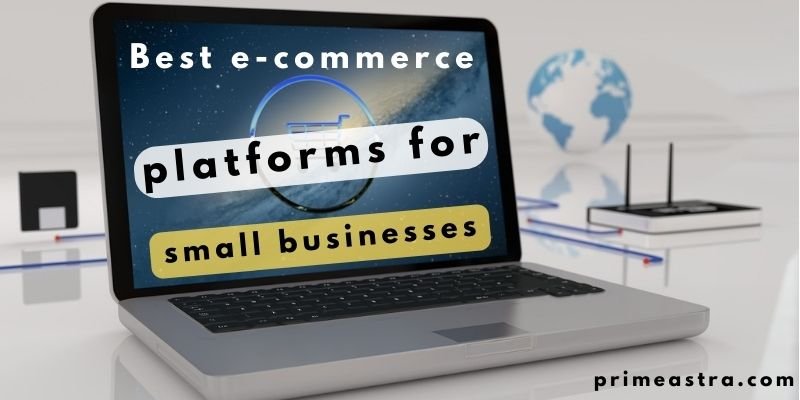
Best e-Commerce Platforms for Small Businesses
When you’re running a small business, choosing the right e-commerce platform can make all the difference. Whether you’re selling handmade crafts, boutique clothing, or innovative tech gadgets, finding the right tools to run your online store smoothly can mean the difference between frustration and success. But with so many options available, how do you know which one is right for you? In this guide, we’ll walk you through the best e-commerce platforms for small businesses, helping you find the perfect fit for your needs.
Why the Right e-Commerce Platform Matters
Imagine you’re a small business owner, selling artisanal candles. You’ve put months into creating the perfect product, but your website is slow, hard to navigate, and constantly crashing. Customers leave before they even complete their purchase. Frustrating, right?
A great e-commerce platform ensures your website runs smoothly, looks professional, and makes it easy for customers to buy your products. It should also be easy to manage, allowing you to focus on what really matters—growing your business.
1. Shopify: The All-in-One Solution
Shopify is often the go-to recommendation for small businesses, and for good reason. It’s user-friendly, offers a wide range of tools, and scales well with your business growth. Even if you’re not particularly tech-savvy, you can set up a professional-looking store in just a few hours.
Key Features:
- Ease of Use: With its drag-and-drop builder, you don’t need to know how to code.
- App Integration: Shopify’s app store is vast, allowing you to add everything from accounting tools to live chat features.
- Responsive Templates: A wide range of mobile-friendly templates to make your store look great on any device.
Shopify does come with a monthly fee, starting at around $29/month, which might be a consideration for some. But when you weigh the cost against the time and stress you save, it’s often a worthy investment.
Anecdote: Sarah, a small business owner from Portland, struggled for months to sell her handmade jewelry online. After switching to Shopify, she was able to build her website in one weekend and saw her sales double within three months.
For more details, you can check out Shopify’s pricing plans and see which one fits your budget.
2. Wix: For Those Who Value Customization
Wix is another popular option, particularly if you’re looking for maximum control over your store’s appearance. With its intuitive drag-and-drop editor, Wix allows you to build a highly customized site, down to the tiniest details.
Key Features:
- Customizable Design: Perfect for creative businesses wanting unique, personalized designs.
- Affordability: With plans starting at $23/month, it’s slightly cheaper than Shopify, making it a great option for those just starting out.
- Marketing Tools: Wix has built-in marketing tools, including email campaigns and SEO guidance.
However, Wix does come with some limitations in scaling and integrating advanced e-commerce features. It’s great for smaller stores or businesses just dipping their toes into online sales, but as you grow, you might find its limitations more evident.
For additional information, explore Wix’s features and pricing to see if it’s the right fit.
3. BigCommerce: For Growing Businesses
BigCommerce is a solid choice for small businesses expecting rapid growth. It offers advanced features that can handle a high volume of transactions and large product catalogs. If you’re looking for something that can grow alongside your business, BigCommerce should be on your radar.
Key Features:
- Built for Scale: BigCommerce is designed for businesses that want to grow without worrying about outgrowing their platform.
- SEO-Friendly: It offers excellent tools for optimizing your store’s SEO, helping you rank higher in search engines.
- No Transaction Fees: Unlike Shopify, BigCommerce doesn’t charge transaction fees, saving you money as your sales increase.
Anecdote: When John’s business took off unexpectedly, his first platform couldn’t handle the increased traffic, leading to crashes and lost sales. After switching to BigCommerce, his site not only handled the increased volume but also saw improved SEO, bringing in even more customers.
Check out more about BigCommerce’s features to see how it supports growing businesses.
4. Squarespace: The Designer’s Dream
If visuals are a key part of your brand (think fashion, art, or photography), Squarespace is a beautiful platform to showcase your products. Known for its stunning design templates, it’s a fantastic option for those who want their store to make a big visual impact.
Key Features:
- Beautiful Templates: Its templates are renowned for being sleek, modern, and professional.
- Mobile Optimization: All templates are responsive, ensuring your site looks great on any device.
- In-Built Features: It offers built-in email marketing, social media integration, and SEO tools, making it an all-in-one solution for small business owners.
Squarespace isn’t as robust as some of the other platforms in terms of e-commerce-specific features, but if you’re looking for a platform that prioritizes design, this might be the perfect fit for you. Pricing starts at $27/month.
For more on Squarespace, visit their website.
5. WooCommerce: The Flexible Option for WordPress Users
If you already have a WordPress site, WooCommerce might be the easiest option for adding e-commerce functionality. WooCommerce is a plugin that turns your WordPress site into an online store. It’s highly flexible and integrates seamlessly with all WordPress themes and tools.
Key Features:
- Completely Free: WooCommerce itself is free, though you’ll need to pay for hosting, domain names, and any premium features.
- Extensibility: Because it’s built on WordPress, you can extend it with thousands of plugins to add extra functionality.
- Full Control: As it’s open-source, you have complete control over every aspect of your store.
Anecdote: Paul had a WordPress blog that was getting great traffic, but he wanted to start selling digital products. With WooCommerce, he was able to integrate a store directly into his existing website without starting from scratch.
For more on WooCommerce, you can explore their site here.
E-commerce Platforms List: A Quick Overview
To give you a quick glance at your options, here’s a summary of the best e-commerce platforms for small businesses:
| Platform | Best For | Starting Price |
| Shopify | All-in-one solution | $29/month |
| Wix | Customization | $23/month |
| BigCommerce | Growing businesses | $29.95/month |
| Squarespace | Design-oriented businesses | $27/month |
| WooCommerce | WordPress users | Free + hosting |
Cheapest E-commerce Platform
If you’re looking for a cost-effective solution, WooCommerce is a popular choice since it’s free to download and use. However, remember that you will need to pay for web hosting and domain registration. Another affordable option is Wix, which starts at just $23/month and offers a solid set of features.
Top 10 E-Commerce Websites for Inspiration
Looking for inspiration? Here are the top 10 e-commerce websites that have set the bar high for online retail:
- Amazon: The biggest name in e-commerce, offering everything from books to groceries.
- Etsy: A marketplace for handmade and vintage items, ideal for small artisans.
- eBay: An auction-based platform that allows you to sell new and used goods.
- Zalando: A leading online fashion retailer in Europe.
- Shopify: Not only a platform but also a successful online store itself.
- Wayfair: A go-to for home goods and furniture.
- Alibaba: The largest global wholesale marketplace.
- Target: Offers a robust online shopping experience alongside its brick-and-mortar stores.
- Best Buy: A technology giant with a strong online presence.
- Warby Parker: Revolutionized the eyewear industry with its direct-to-consumer model.
Best E-commerce Platform for Beginners
If you’re just starting out, Shopify is often considered the best e-commerce platform for beginners due to its user-friendly interface and comprehensive support resources. Its extensive app ecosystem allows new users to easily integrate features as their business grows.
Is Amazon an E-commerce Platform?
Absolutely! Amazon is one of the largest e-commerce platforms in the world. It allows small businesses to sell products directly to consumers, making it a fantastic marketplace for small businesses to reach a massive audience. However, it’s worth noting that selling on Amazon can come with fees, and competition is fierce.
Best E-commerce Platform for Clothing
For fashion retailers, the best e-commerce platform for clothing is often Shopify. With its stylish templates, inventory management tools, and ability to integrate with social media platforms, it’s designed specifically for apparel brands looking to showcase their products beautifully.
Conclusion
Choosing the best e-commerce platform for small businesses is crucial for your online success. Whether you prioritize design, scalability, or ease of use, there’s an option out there that suits your needs perfectly. From the all-in-one solution of Shopify to the flexibility of WooCommerce, take your time to explore these platforms and find the right fit for your business.
FAQ: Best e-Commerce Platforms for Small Businesses

Yasir Farooq is a seasoned Business Manager and author at primeastra.com, sharing insights on business strategies and management. With a strong background in business operations, Yasir provides readers with practical advice to help them succeed in the competitive business landscape.

